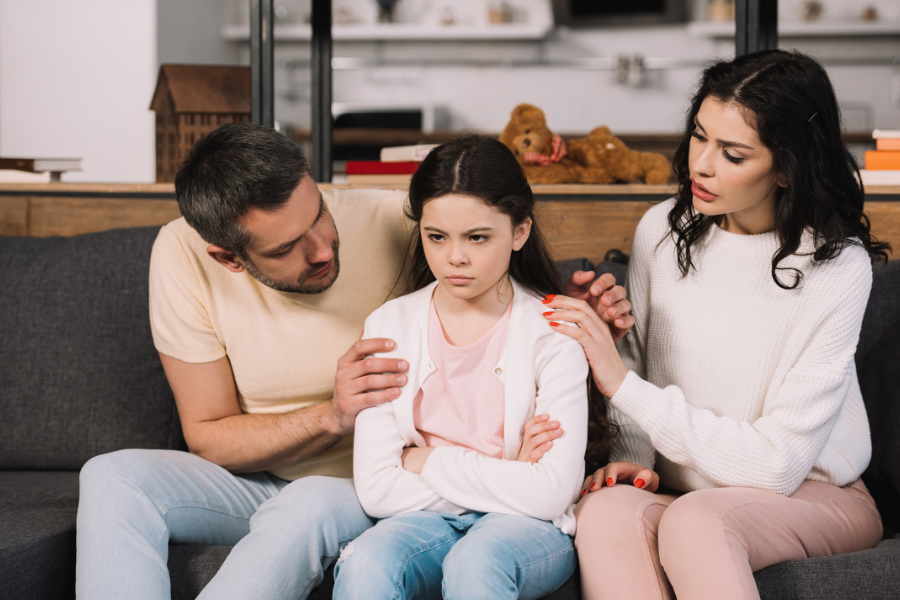Divorce is a significant life event that affects not only the immediate family but also extended relatives. Over 40% of marriages in the United States end in divorce. It’s a staggering number, and it raises important questions about the well-being of families in the aftermath of divorce.

Some of the most common questions are: how does divorce affect children? What about the relationship between parents and their adult children? And how does it impact the extended family?
At Sunstone Counseling, we understand the complexities of family dynamics during and after divorce. If you're struggling with the effects of divorce on your family, we’re here to help.
How Divorce Affects Children
Divorce presents an overwhelming challenge for families. While its impact is felt within the immediate family, extended relatives also grapple with many unsettling emotions.
Divorce can be particularly tough on children. However, in cases where irreconcilable differences create a volatile household, divorce might be the healthiest option for the family. Maintaining an open, loving, and communicative relationship fosters the best environment for children navigating their parents' divorce. Studies show that children often adjust well to the new family dynamic under these circumstances.
Minor Children

Children can exhibit a range of responses to divorce, which can significantly influence their relationships with both parents and siblings. Parenting styles and co-parenting skills play an important role in how children adapt to the new family dynamic. Here are some common relationship shifts that may occur:
- One child may align with one parent and exclude the other, a phenomenon known as splitting.
- In families with multiple children, each child may have a different parent.
- All children may align with one parent, leaving the other marginalized.
Parental conflict increases the likelihood of sibling conflict, creating an unhealthy dynamic that immerses children in their parents' discord. This situation not only places an unfair emotional burden on the child but can also lead to layers of trauma that persist into adulthood. As a result, children may come to view unhealthy relationship dynamics as normal, potentially seeking partners who reflect the same patterns they observed in their parents' relationship.
Relationship With Parents and Guardians
The mental well-being of parents significantly influences the parent-child relationship following a divorce. Children may exhibit various behaviors, including:
- Showing a preference for the parent of the same gender.
- Favoring the parent of the opposite gender.
- Blaming one parent for the divorce.
- Preferring the parent who adopts a more permissive approach.
To foster a healthy family dynamic post-divorce, parents should refrain from speaking negatively about each other in front of their children. Consistency in co-parenting decisions and adhering to a predictable schedule that meets the child's needs is essential. Encouraging children to take sides can exacerbate conflict and distress. Parents should be mindful of their behavior around their children, as even subtle cues can impact the child's perception and well-being. Children are sensitive to their parent's emotions and attitudes, accentuating the importance of creating a supportive and nurturing environment during and after the divorce process.
Adult Children
Upon learning about their parents' divorce, adult children often experience a range of emotions. Feelings of confusion and betrayal may overshadow their childhood memories, leading to a desire to distance themselves from their parents to process the situation temporarily. During this challenging time, adult children may seek solace from their siblings, relying on their bond for support.
However, if one parent is involved in infidelity or betrayal, the adult child's perception of that parent may change significantly. This newfound perspective can strain the parent-child relationship, causing feelings of resentment and distancing. Ultimately, such circumstances may alter the dynamics within the family, affecting the closeness and trust between family members.
How Divorce Impacts Extended Family
 Extended family members often experience a mix of emotions, such as sadness, betrayal, and confusion, when confronted with a divorce within the family. Some may support their family members, while others may distance themselves from them for not persevering through the marriage. Ideally, extended family members offer support and adapt to the new circumstances.
Extended family members often experience a mix of emotions, such as sadness, betrayal, and confusion, when confronted with a divorce within the family. Some may support their family members, while others may distance themselves from them for not persevering through the marriage. Ideally, extended family members offer support and adapt to the new circumstances.
However, when children are involved, it may take time for extended family members to adjust to interacting with the ex-spouse, and some may prefer to avoid contact altogether. Maintaining relationships with the ex-spouse can initially feel awkward or uncomfortable when children or grandchildren are part of the equation. Research indicates a decline in closeness and interaction with the ex-spouse post-divorce, highlighting the challenges of navigating family dynamics during this transition.
When to Try Family Therapy
Divorce greatly influences family relationships and dynamics. While navigating this process can be arduous and stressful, families prioritizing healthy communication and nurturing relationships often find it easier to adapt and adjust. There are also divorce support groups for women, which can behelpful to talk and share similar experiences, while also receiving steps to heal.
For families preparing for divorce, therapy can provide a stable place to talk about what’s happening with everyone and prepare for changes. Divorce is a challenging and emotionally overwhelming experience for families.
At Sunstone Counseling, we provide compassionate support and guidance to families dealing with the difficulties of divorce. Whether you are a parent who needs help to support your children during this period of change or an adult child experiencing emotional turmoil, our team is here to assist you. Book a session with us today and take the first step towards healing your family.




